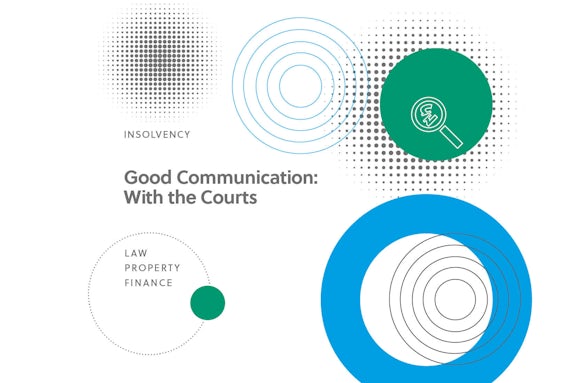Good communication is crucial to the smooth running of any insolvency. This is particularly the case when making applications to the Court. Clear communications should be issued to all interested parties before the Court is approached no matter what orders are being sought.
In the case of administration for example, the English Courts in Re Pudsey Steel Services Limited [2015] BPIR 1459 highlighted that considerable weight needs to be given to the views of creditors when the Court is making decisions on administration applications before it. It is clear that the Court needs to be given details on what the creditors’ views are within the application process before any orders can be granted.
A recent application
In a recent application we presented to the Court of Session for administrators seeking approval of their remuneration and to extend the period of the administration, we advised that two main issues ought to be addressed before the application was presented. The first was to ensure that all creditors were given the administrators’ updated progress report. The second was that the creditors should also be given notice of the administrators’ intention to make the Court application, and that absent any comments in response within a set period of time the Court would be advised that no objections had been raised by any creditor. By engaging with both secured and unsecured creditors in this way before the application was made we were able to save time and costs by having any need to advertise and intimate the application dispensed by the Court. This ultimately resulted in the remuneration being granted without the need for a hearing (the remuneration was over £1 million) and allowed for the administration period to be extended by 12 months within a fortnight of that application being made.
The case of Thomas Auld and Sons
Good communication is critical in all insolvency procedures of course. In the recent case of Thomas Auld and Sons [2019] CSOH 83, the Court of Session gave an enlightening practical insight as to how a liquidator should keep clear and complete records of all decision-making (the liquidator lodged a sworn affidavit narrating various matters to the Court), how the liquidator should then deal with any issues that are raised by a reporter (or the Auditor) on a remit to consider the liquidator’s remuneration, and how the Court expects those communications to have been clear and complete. Here, the Court formed the view that “it does appear to me that to some extent there has been a breakdown in communication between the [liquidator] and the reporter.” Having heard in detail from the liquidator in this case, the Court was ultimately able to make a properly informed decision on the ultimate award for remuneration, in this case at the leave sought by the liquidator without the significant abatement recommended by the reporter and the Auditor.
To summarise
It is clear that the Court expects all insolvency practitioners to keep clear and accurate records, to be clear with their communications in advance of coming before the Court, and also to make those communications readily available to the Court when making any form of application.
If you want to join our Insolvency mailing list please contact us here
Should you have any questions on any of the articles in this series please contact:
Eilidh MacEwan by email: emacewan@gilsongray.co.uk or by phone: 0131 285 1809 / 07376 192 463.
Steven Jansch by email: sjansch@gilsongray.co.uk or by phone: 0131 516 5361 / 07841 920 100.
Craig Darling by email: cdarling@gilsongray.co.uk or by phone: 0141 530 2044/07841 920 467
You can visit our dedicated Insolvency page here
The information and opinions contained in this blog are for information only. They are not intended to constitute advice and should not be relied upon or considered as a replacement for advice. Before acting on any of the information contained in this blog, please seek specific advice from Gilson Gray







